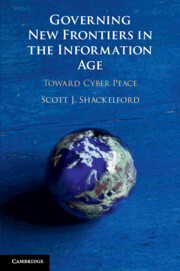'In this pioneering work, Scott Shackelford takes a long overdue multi-disciplinary look at various global commons to tease loose lessons that can inform governance and security in cyberspace. Finding that cyberspace is an ‘imperfect commons’ comprised of shared global infrastructure, Professor Shackelford draws on these lessons to craft surgically an insightful polycentric approach to fostering ‘cyber peace’ in this ‘frontier of international relations.’ It is an approach that is thoughtful, inclusive, practical, and value-driven - one that takes thinking on the subject to the next level and will move multi-stakeholder dialogue on cyberspace governance in exactly the right direction. A must-read.'
Michael Schmitt - University of Exeter
'A fresh, rigorous, and useful take on the many international governance challenges of the twenty-first century. Given the breadth, depth, and complexity of global commons examined - ranging from climate change to cyberspace to outer space - Shackelford somehow manages to write accessibly and with incredible insight and wit. This book is a must-read for anyone interested in the common heritage and future of humanity.'
Brett M. Frischmann - Charles Widger Endowed University Professor in Law, Business and Economics, Villanova University, Pennsylvania
'In Governing New Frontiers in the Information Age, Scott Shackelford merges theories of the best ways to govern the internet we share (the commons we call cyberspace) with the grim reality of cyber-war, cyber-theft, and other malicious online practices. All is not lost - he reminds us that there are many other examples where the international community has addressed similar shared problems. Moreover, Shackelford uses stories to make these cases more compelling to readers and challenges the readers with insights from a wider range of disciplines. In doing so, he teaches us that there is no one nor way to govern the many problems that devil our lives in cyberspace. Shackelford has written a fun read with important insights for policymakers, executives, scholars, and students.'
Susan Ariel Aaronson - George Washington University
'In Governing New Frontiers in the Information Age, Scott Shackelford has skillfully drawn out and applied lessons from other transnational governance issues to the seemingly boundless challenges of cyberspace. This book is intellectually ambitious, with important lessons for scholars, policy makers, and practitioners looking to manage cyber risk and promote cyber peace.'
Adam Segal - Ira A Lipman Chair in Emerging Technologies and National Security and Director of the Digital and Cyberspace Policy Program
'Shackelford provides fascinating insights on how to govern the new frontiers of cybersecurity, where physical borders offer us no protection. He offers fascinating insights from previous international governance challenges, ranging from underseas minerals to orbital debris. Shackelford’s erudition is apparent, drawing on wide-ranging sources to show potential solutions to the deepest problems of international cybersecurity.'
Peter Swire - Georgia Institute of Technology and Expert on Privacy and Cybersecurity
‘… the author extends the polycentric theory of governance to non-traditional areas: space, the oceans, cybersecurity, and climate change … innovative book …’
J. A. Stever
Source: Choice



